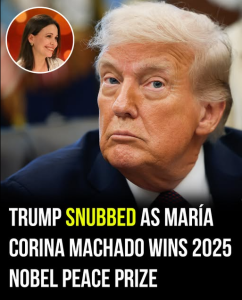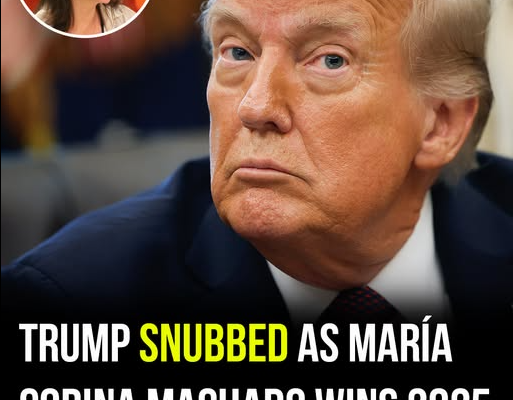
Trump Snubbed as María Corina Machado Wins 2025 Nobel Peace Prize
María Corina Machado, a prominent Venezuelan opposition leader, has been awarded the Nobel Peace Prize for 2025, in what many observers are calling one of the most politically charged selections in recent years. Her win, celebrated by democracy advocates worldwide, came as a disappointment to supporters of Donald Trump, who had been rumored to be a contender for the prize due to his diplomatic initiatives during his presidency.
The decision marks a historic moment not only for Venezuela but also for global democratic movements. It highlights the power of civil resistance in the face of authoritarian regimes—and sends a clear signal from the Norwegian Nobel Committee about where the world’s moral spotlight is currently focused.
A Symbol of Defiance in Venezuela
María Corina Machado, long known as one of the most fearless critics of the Venezuelan regime, has spent years fighting for democratic change in her country. A former member of parliament, she became a key figure in opposing the government led by Nicolás Maduro, enduring arrests, harassment, and threats for her activism.
Despite bans that attempted to keep her out of politics, Machado rose to lead the Venezuelan democratic opposition. Her courage and determination made her a unifying figure both inside Venezuela and among the international community. She has consistently called for nonviolent resistance, free elections, and the restoration of fundamental human rights.
In announcing the award, the Nobel Committee praised her “extraordinary leadership and unwavering commitment to democratic principles in the face of oppression,” adding that “her struggle embodies the hope of millions of Venezuelans yearning for freedom.”
An Emotional Reaction
Upon receiving the news, Machado reportedly broke into tears. Surrounded by supporters in Caracas, she gave an impassioned speech:
“This prize does not belong to me alone. It belongs to every Venezuelan who refused to be silenced. It belongs to the mothers who marched for their children, to the students who raised their voices, to the people who believed that freedom was worth fighting for. This award is a light in the darkness—and we will keep walking toward it together.”
Crowds gathered spontaneously in several Venezuelan cities to celebrate the announcement. Videos shared on social media showed people waving flags, singing, and chanting “¡Libertad!”—freedom.
A Blow to Trump’s Supporters
For weeks, speculation had swirled around who might receive the 2025 Peace Prize. Several international betting markets had listed Donald Trump as a strong contender. His supporters had cited diplomatic agreements during his presidency and recent international appearances as achievements that could merit the honor.
When the committee announced Machado as the laureate, many Trump allies expressed frustration. Some conservative commentators accused the Nobel Committee of being “politically biased.” Others claimed the decision was a “snub” designed to diminish Trump’s global influence.
One prominent Trump ally wrote on social media:
“Trump brought historic peace deals to the table. He deserved this prize more than anyone. This was pure politics.”
The Nobel Committee, however, rejected claims of political targeting. In its statement, it stressed that its decision was based on “the impact of nonviolent struggle for democracy and human rights,” not partisan considerations.
Why the Committee Chose Machado
Analysts believe the Nobel Committee’s decision reflects a broader focus on defending democratic values in a world increasingly challenged by authoritarianism. Venezuela’s crisis has drawn international attention for years: economic collapse, political repression, and the mass displacement of millions of citizens.
By choosing Machado, the committee aligned itself with a movement built on civil resistance rather than state power. Unlike heads of state or political celebrities, Machado represents grassroots democratic courage.
According to the official statement:
“Machado’s unwavering fight for free and fair elections, her dedication to nonviolent political change, and her resilience under persecution make her a symbol of hope for all who live under oppression.”
A Dangerous Fight for Democracy
Machado’s political journey has been anything but easy. She first gained prominence as a critic of the late Hugo Chávez and quickly became a target for the regime. Over the years, she was barred from running for office, stripped of her seat in the National Assembly, and investigated repeatedly by pro-government institutions.
Still, she never left Venezuela. Her refusal to go into exile made her a powerful symbol of resistance. Many Venezuelans view her as the embodiment of their own struggles—someone who faces the same hardships yet refuses to give up.
In 2023 and 2024, she became the leading voice behind efforts to unify opposition groups. Her campaign to push for internationally recognized elections inspired hope among millions.
Her courage has come at a high personal cost: harassment, threats to her family, and constant surveillance.
The Global Reaction
International reaction to the announcement was swift and overwhelmingly supportive. Leaders from Europe and Latin America congratulated Machado, praising her dedication to democratic ideals.
-
The European Union issued a statement calling her “a beacon of hope in Venezuela’s democratic struggle.”
-
Leaders in several Latin American nations expressed solidarity, saying the award highlighted the urgent need for democratic transitions across the region.
-
Human rights groups, including Human Rights Watch and Amnesty International, celebrated the decision as “long overdue recognition” of Venezuela’s civil resistance movement.
Even some critics of the Nobel Prize’s past selections agreed that this year’s choice carried powerful symbolism.
Trump’s Response
Donald Trump responded to the news in characteristic fashion, posting on social media:
“The Nobel Prize has become a political joke. Everyone knows who deserved this more than anyone else. SAD!”
His message was widely shared, sparking debates online between supporters and critics.
Some Trump allies framed the decision as an intentional slight against him. Others acknowledged Machado’s courage but maintained Trump’s achievements should not have been overlooked.
Political analysts say Trump’s reaction underscores how the Nobel Peace Prize can carry significant symbolic weight on the world stage—even when it has no direct political power.
The Meaning of This Year’s Prize
The Nobel Peace Prize has often reflected the moral concerns of its time. From Nelson Mandela to Malala Yousafzai, many laureates have been chosen for their resistance to oppressive regimes rather than their control over governments.
By awarding the prize to María Corina Machado, the Nobel Committee placed the spotlight squarely on the struggle for democracy in Venezuela and, more broadly, on civil movements challenging authoritarianism worldwide.
This decision also underscores a subtle message: the committee appears to be prioritizing grassroots movements over powerful political figures.
What Comes Next for Machado
Winning the Nobel Peace Prize gives Machado a louder voice on the world stage. It amplifies international attention on Venezuela’s political crisis and increases pressure on the Maduro regime to allow democratic reforms.
However, it also places Machado in a delicate position. The award may further inflame tensions with the government, which has long sought to discredit her. Analysts warn that she may face even more intense scrutiny, restrictions, or retaliation.
Machado herself acknowledged the risks in her acceptance speech:
“This is not a finish line. This is a call to keep going. My fight continues—not for prizes, but for a free Venezuela.”
A Moment That Resonates Beyond Venezuela
Machado’s win isn’t just a personal victory. It’s a rallying cry for democracy movements around the globe. Her recognition by the Nobel Committee sends a message to activists in other countries facing authoritarianism: the world is watching, and courage can be honored.
While Trump’s supporters may see this as a snub, others view it as a reaffirmation of the prize’s core mission: honoring individuals who champion peace and human rights over political power and personal ambition.
Conclusion: A Nobel Moment with Global Impact
The 2025 Nobel Peace Prize will be remembered as a pivotal moment for Venezuela and for democracy advocates worldwide. María Corina Machado’s journey from persecuted dissident to Nobel laureate is a testament to the power of resilience, courage, and nonviolent resistance.
Donald Trump may have been a contender, but this year, the prize went to someone who represents not statecraft, but the raw, human fight for freedom.
In awarding the prize to Machado, the Nobel Committee didn’t just honor one woman. It honored a movement — and sent a message to the world: the fight for democracy matters

